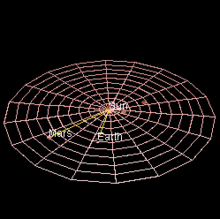Omniscience
Appearance

Omniscience mainly in religion, is the capacity to know everything that there is to know. In particular, Hinduism, Jainism and the Abrahamic religions (Judaism, Christianity, and Islam) believe that there is a divine being who is omniscient. An omniscient point-of-view, in writing, is to know everything that can be known about a character, including past history, thoughts, feelings, etc. In Latin, 'omnis' means "all" and 'sciens' means "knowing".
Quotes
[edit]- Quotes are arranged alphabetically by author
A - F
[edit]
- Let us leave this God of Pointland to the ignorant fruition of his omnipresence and omniscience: nothing that you or I can do can rescue him from his self-satisfaction.
- Edwin Abbott Abbott, Flatland: A Romance of Many Dimensions (1884) Chapter 20. How the Sphere Encouraged Me in a Vision
- His views, policy and purposes were sometimes even more astounding than his curious gaps or lapses of omniscience. On the whole, the relation was the queerest that Henry Adams ever kept up.
- Henry Adams in: The Education of Henry Adams, The Floating Press, 1 January 2009, p. 389.
- We have had enough of their omniscience, their parade of technical knowledge, and their predilection for the wrong end of the stick.
- Aubrey Beardsley in:Beardsley: a biography, G. Braziller, 1967, p. 86.
- All the attributes of God, except omnipotence, are inferences. His omnipresence, His omniscience, His justice, mercy, and truth, are the deductions of reason, and however true and demonstrable, they exercise little influence over the mind;
- Sir David Brewster in: The Evangelical Repository, Volumes 1-2, Lang, Adamson, 1855, p. 62

- It’s all ridiculous and enjoyable, and at the movie’s center is an actress creatively guessing at what omniscience might feel like. I don’t know any other movie star going where Johansson has gone lately — certainly among the crop that sells magazine covers — and it’s probably beside the point asking whether she’s tired of the standard roles offered to pillow-lipped young actresses or is actively engaged in exploring the outer limits of power and perception.
- We find that actual, concrete knowledge, that is, the great work of toilsome discovery, has one deadly enemy, omniscience. The Jews are a case in point.
- Houston Stewart Chamberlain in: H.S. Chamberlain The Foundations of the Nineteenth Century, Рипол Классик, p. 275.
- What appears to be injustice in our eyes, in the sight of omniscience may be justice. God's ways are not our ways.
- Voltairine de Cleyre in: Exquisite Rebel: The Essays of Voltairine de Cleyre -- Anarchist, Feminist, Genius, SUNY Press, 1 February 2012, p. 170.
- The Internet has made me very casual with a level of omniscience that was unthinkable a decade ago. I now wonder if God gets bored knowing.
- Douglas Coupland in: John Brockman, How is the Internet Changing the Way You Think?: The net's impact on our minds and future, Atlantic Books Ltd, 1 July 2011, p. 160.
- What mystifies me is how he or any one else can determine what is a desirable type of industry such as should qualify for special assistance of this kind. In my own simple way I should have thought that a desirable industry was, almost by definition, one which could establish itself and thrive without special assistance in ordinary market conditions. Anything else suggests a degree of omniscience which I, at least, am not prepared to credit even the most expert with. I trust the commercial judgment only of those who are themselves taking the risks.
- John James Cowperthwaite in: Jon Woronoff Hong Kong, capitalist paradise, Heinemann Asia, 1980, p. 34.
- Jealousy is never satisfied with anything short of an omniscience that would detect the subtlest fold of the heart.
- George Eliot in: Creating Character Emotions, Writer's Digest Books, 15 February 1998, p. 101.
- I hope you can feel the omniscience of this moment, as we have been blocking this traffic as far as you can.
But like the desire for eternal life, the desire for omniscience and absolute perfection is merely an imaginary desire;- Ludwig Andreas Feuerbach in: Ludwig Feuerbach Lectures on the essence of religion, Harper & Row, 1967, p. 278.
- Whatever seemed unattainable to his desires - or forbidden to him - he attributed to these gods. One may say, therefore, that these gods were the ideals of his culture. Now he has himself approached very near to realizing this ideal, he has nearly become a god himself. But only, it is true, in the way that ideals are usually realized in the general experience of humanity. Not completely; in some respects not at all, in others only by halves. Man has become a god by means of artificial limbs, so to speak, quite magnificent when equipped with all his accessory organs; but they do not grow on him and they still give him trouble at times.
- Sigmund Freud in: Civilization And Its Discontents, p. 35.
G - L
[edit]- But if two's company, three's a crowd - and that demands the omniscient point of view.
- Arthur Herzog, in: How to Write Almost Anything Better and Faster!, Arthur Herzog III, 2006 , p. 63.
- For if you truly believe in the omniscience and omnipresence of the Lord, then surely are we not always in His presence.
- Randall Jarrell in:The Ring Cycle, kacl780.net.
- Total freedom from change would imply total freedom from error; but this is the prerogative of Omniscience alone. The world, however, is very censorious, and will hardly give a man credit for simplicity and singleness of heart, who is not only in the habit of changing his opinions, but also of bettering his fortunes by every change.
- Lacon in: George Washington Doane, et al., Episcopal Watchman, Volume 3, H. Huntington, Jr., 1830, p. 220.
M - R
[edit]- The philosophers have uttered very perverse ideas as regards God's Omniscience of everything beside Himself; they have stumbled in such a manner that they cannot rise again, nor can those who adopt their views.
- Maimonides in: The Guide for the Perplexed, Digireads.com Publishing, 1 January 2004, p. 299


- What makes us omniscient? Have we a record of omniscience? We are the strongest nation in the world today. I do not believe that we should ever apply that economic, political, and military power unilaterally.
- Robert McNamara in: James G. Blight, Janet M. Lang The Fog of War: Lessons from the Life of Robert S. McNamara, Rowman & Littlefield, 2005, p. 139

- Gommaṭeśvara realized the transience of worldly affairs and went to the forest to perform austerities in order to escape the sufferings of existence. It is said that he stood in a meditative posture for so long, that vines grew up around his body. Although Gommaṭeśvara achieved omniscience and became a kevalin, he did not preach in a samavasaraṇa and therefore did not become a Tīrthaṅkara.
- Lisa N. Owen in: Demarcating Sacred Space: The Jina Images At Kalugumalai: International Journal of Jaina Studies (Online) Vol. 6, No. 4 (2010) 1-28 , SOAS, University of London.
- Can omniscient God, who
Knows the future, find
The Omnipotence to
Change His future mind?- Karen Owens in: The God Delusion, Random House, 22 September 2009, p. 101.
- Google is omniscient of what people search for and do. Facebook has over a billion subscribers, meaning Mark Zuckerberg has personal information about one in every seven people on Earth. U.S.A., Brazil, Mexico, India and Indonesia are at the top of that list.
- Eduardo Paes in:Open Government, huffingtonpost.com.
- Knowledge born of the finest discrimination takes us to the farthest shore. It is intuitive, omniscient, and beyond all divisions of time and space.
- Patanjali in: Alistair Shearer The Yoga Sutras Of Patanjali , Random House, 28 July 2010, p. 70.
- There is nothing that so aids and assists the awakening of omniscience within us as insistent thoughts about one’s own transgressions, errors.
- Leanne Payne in: The Broken Image: Restoring Personal Wholeness Through Healing Prayer, Baker Books, 1 September 1995, p,139.
- And if we ascribe to God, in addition to His omnipotence and omniscience, also the attributes of goodness and love, recourse to Him produces an increased feeling of safety ...
- Max Planck in: Self-realization Magazine, Volumes 21-23, Self-Realization Fellowship, 1950, p. 31.
- Errors of knowledge are not breaches of morality; no proper moral code can demand infallibility or omniscience.
- Ayn Rand in: The Virtue of Selfishness, Penguin, 1 November 1964, p. 66.
- The law of reality, that A is non-A, and that omniscience [is] about the physical universe (including electricity, gravitation, the solar system, etc ...
- Ayn Rand in: For The New Intellectual The Philosophy of Ayn Rand, naturalthinker.net.
- Any lack of that joyousness develops body-destroying toxins. That inner ecstasy of the mind is the secret fountain of perpetual youth and strength in any man. He who finds it finds omnipotence and omniscience.
- Walter Russell in: The Man Who Tapped the Secrets of the Universe, Filiquarian Publishing, LLC., 1 January 2008, p. 15.
S - Z
[edit]

- In Theravada Buddhism, Buddha's omniscience is claimed only with respect to diagnosing the cause of dukkha and prescribing the way of removing it, the further wrinkle being that the Buddha unlike other arhants, knew this remedy in each individual case, whereas the arhants by and large relied on the four noble truths, which in any case has been had been propounded by Buddha.
- Arvind Sharma in: Religious Studies and Comparative Methodology: The Case for Reciprocal Illumination, SUNY Press, 1 June 2006, p. 130.
- Rationality is bounded when it falls short of omniscience. And the failures of omniscience are largely failures of knowing all the alternatives.
- Herbert A. Simon in: Emanuele Bardone Seeking Chances: From Biased Rationality to Distributed Cognition, Springer Science & Business Media, 16 March 2011, p. 23.
- The Jina or the 'conquering saint', who has conquered all worldly desires is with Jains what the Buddha or the perfectly enlightened saint is with Buddhas. He is also called Jineswara (chief of the Jinas), Arhat, "the venerable ", Tirthankara or the saint who has made the passage of the world, Sarvajna (omniscient), Bhagavat (holy one).
- Swami Sivananda in: Jainism, sivanandaonline.org
- According to the belief of the Jains, only the omniscient are able to give a right code of rules of life. These teachers or Tirthankaras are not creators or rulers of the world. They are pure divine souls, who have attained perfection. They never again take human birth.
- Swami Sivananda in: "Jainism"


- And yet viewing several depictions of even an imaginary city, is enlightening in a way, Leibniz said. "Each painter can view the city from only one standpoint at a time, so he will move about the place, and paint it from a hilltop on one side, then a tower on the other, then from a grand intersection in the middle--all in the same canvas. When we look at the canvas, then, we glimpse in a small way how God understands the universe--for he sees it from every point of view at once. By populating the world with so many different minds, each with its own point of view, God gives us a suggestion of what it means to be omniscient."
- Neal Stephenson in:Quicksilver, Random House, 31 May 2012, p. 265.
- Omniscience, the foremost attribute of a liberated jiva, is the emblem of its purity; thus, a liberated soul, such as a Tirthankara, is called a kevalin (“possessor of omniscience”). However, not all kevalins are Tirthankaras: becoming a Tirthankara requires the development of a particular type of karmic destiny.
- G. Ralph Strohl in: Karma, Encyclopedia Britannica, 23 March 2014.
- No End of Fun
So he got to have happiness,
he's got to have truth, too,
he's got to have eternity
did you ever!
He has only just learned to tell dreams from waking;
only just realized that he is he;
only just whittled with his hand né fin
a flint, a rocket ship;
easily drowned in the ocean's teaspoon,
not even funny enough to tickle the void;
sees only with his eyes;
hears only with his ears;
his speech's personal best is the conditional;
he uses his reason to pick holes in reason.
In short, he's next to no one,
but his head's full of freedom, omniscience, and the Being.
beyond his foolish meat—
did you ever!- Wisława Szymborska in: No End of Fun, lit.genius.com.
- To say that God is omniscient is to say that He possesses perfect knowledge and therefore has no need to learn. But it is more: it is to say that God has never learned and cannot learn.
- A.W. Tozer in:Knowledge of the Holy, James Clarke & Co., 1 January 2001, p. 61.
- In relation to the universe, God is Omnipotent, Omnipresent and Omniscient, meaning, He is All-Powerful, Ever-Present and All-Knowing. God's omnipotence signifies absolute power and absolute freedom
- John S. Weeke in: Understanding the Existence of God, Trafford Publishing, 2010, p. 15

- When God is our Holy Father, sovereignty, holiness, omniscience, and immutability do not terrify us; they leave us full of awe and gratitude. Sovereignty is only tyrannical if it is unbounded by goodness; holiness is only terrifying if it is untempered by grace; omniscience is only taunting if it is unaccompanied by mercy; and immutability is only torturous if there is no guarantee of goodwill.
- Ravi Zacharias in: Cries of The Heart, Thomas Nelson Inc, 28 October 2002 , p. 24.
- Omniscience is the property of having complete or maximal knowledge. Along with omnipotence and perfect goodness it is usually taken to be one of the central divine attributes. Philosophical considerations of omniscience often derive from “perfect being theology”, the idea made famous by St. Anselm, that God is that than which nothing greater can be thought. Among the features typically taken to contribute to greatness is perfect knowledge.
- Edward N. Zalta in: Stanford Encyclopedia of Philosophy, plato.stanford.edu

